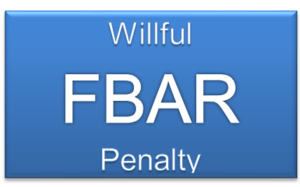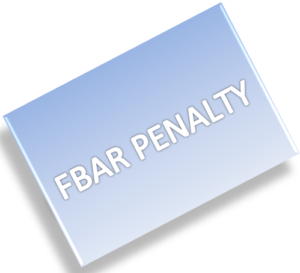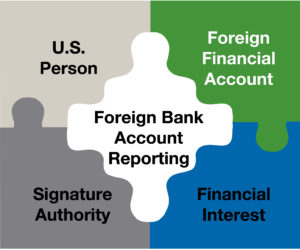On September 21, 2023 a former CFO of a Russian natural gas company was sentenced to seven years in prison, ordered to pay $4 million dollars in restitution and an additional $350,000 in fines in connection with a number of tax and financial reporting crimes that included engaging in a scheme to hide millions of dollars in income in undisclosed Swiss bank accounts, submitting false filings with the IRS, failure to file a Report of Foreign Bank and Financial Accounts (“FBAR”), making false statement to the IRS, and willfully failing to file tax returns. The Russian CFO was also named a defendant in a $44 million dollar FBAR Penalty Suit commenced by the U.S. Government in June of 2023 (See Complaint styled as: United States of America v. Mark Anthony Gyetvay).
INTRODUCTION
31 U.S.C. § 5314 requires U.S. Citizens and Permanent Resident of the United States to file a “report.” The FBAR implementing regulations provide that a “U.S Person who has a financial interest in or signature or other authority over a bank, securities or other financial account in another country” is required to file an FBAR “for any year in which the aggregate balance for such foreign financial account or accounts exceeds $10,000 at any time during the calendar year” See 31 C.F.R. § 1010.350(a) and 31 C.F.R. § 1010.306(c) (2011).
31 U.S.C. § 5321(a)(2) authorizes the Secretary of the Treasury to impose penalties for failure to file an FBAR report. The relevant FBAR penalty provisions include a $10,000 Penalty under Section 5321(a)(5)(B) for non-willful violations (the “Non-Willful FBAR Penalty”), which may be excused where “reasonable cause” can be established as well as a Willful FBAR Penalty for willful violations. The Willful FBAR Penalty under Section 5321(a)(5)(C) is the greater of $100,000 or 50% percent of the amount of the “transaction” or in cases where no FBAR is filed, the balance in the account at the time of the violation.
Persons who fail or refuse to file their FBARS and/or those who fail or refuse to report the income derived from their Foreign Financial Accounts (“FFA’s”) may feel that the Government has overlooked them. Those who have hidden their foreign assets by placing them in the name of a nominee, Shell Company or some other entity may, likewise, now feel they are safe.
Prior to the termination of the Offshore Voluntary Disclosure Program (“OVDP”) in September of 2018, at risk Taxpayers sought protection from criminal prosecution by entering into the OVDP. Some OVDP participants deliberately omitted large account balance FFA’s from their FBAR filings in order to reduce the Miscellaneous Offshore Penalty. Other elected to “Opt Out” of the OVDP in hopes of either no penalty or paying the less onerous Non Willful FBAR Penalty.
There were also those who attempted to game the system by foregoing the use of the OVDP or it prior iterations and instead utilizing one of the two Streamlined Procedures as a means of avoiding the costly Willful FBAR Penalty, associated legal costs and possible criminal prosecution.
Taxpayers who intentionally omitted FFA’s with significant balances have been subject to the Willful FBAR Penalty, and in some cases, have also been prosecuted. Some U.S. Taxpayers, who Opted Out of the OVDP, have been successful in reducing or totally avoiding any FBAR Penalty. However, many others have been less fortunate and consequently subject to the Willful FBAR Penalty in amounts far in excess of the Miscellaneous Offshore Penalty they would have paid had they remained in the OVDP.
The offshore tax evasion playbook, which has been around for quite some time with some slight variations, is still in use. Some of the practices include, but are not limited to, forming an offshore nominee entity in a blacklisted or designated tax haven jurisdiction and opening an FFA in the name of the nominee, Shell Company or other entity to obscure the identity of the true account owner. In many cases, the true account owner will secretly retain beneficial ownership in the FFA or asset as a means of retaining control and dominion over the account proceeds.
A savvy tax cheat will on occasion will have the mail related to the offshore account or asset held at the Foreign Financial Institution. The true account owner will then periodically travel to the foreign country to retrieve the mail in person or make arrangements for someone else to. Alternatively, the account owner will meet with a representative from the Foreign Financial Institution in the U.S. for the handoff.
For their part, Foreign Financial Institutions (“FFI’s”), Wealth Management Firms and other foreign counterparts have historically accommodated, promoted, and actively facilitated the secreting of offshore assets and income by U.S. taxpayers in exchange for receiving substantial bank, legal and advisory fees. Foreign governments have also been complicit by either turning a blind eye to these illicit practices or by relying on bank secrecy laws. That has all changed thanks to U.S. global enforcement initiatives, international cooperation and the recent 80 billion dollars received by the IRS.
ENFORCEMENT HISTORY AND DEVELOPMENT
The catalyst for change started in 2008 when the DOJ prosecuted Swiss UBS, as well as a number of its advisors, attorneys and financial professionals for assisting U.S. taxpayers in hiding foreign assets and income from the IRS. To avoid prosecution, UBS and the U.S. Government entered into a deferred prosecution agreement (DPA’s) wherein UBS was, among other things, required to pay stiff penalties and admit that it’s cross border banking practices made use of Swiss privacy laws to aid and assist U.S. Taxpayers in committing offshore tax evasion. As part of the deal, UBS also agreed to take affirmative steps to improve transparency and to provide the U.S. Government with information on its U.S. account holders.
Since the UBS case and the DOJ’s establishment of the Swiss Bank Program, many FFI’s have been subject to prosecution and have entered into either DPA’s or a non-prosecution agreements (“NPA’s”). These institutions have also been required to pay large penalties, agree to compliance reforms and have had to provide information on their U.S. account holders. Even small FFI’s that rely on correspondent banks to process financial transactions have not escaped DOJ scrutiny. They too have had to tow the line.
While the U.S. assault on international banking practices and U.S. account holders over the past fifteen years has motivated some U.S. customers to come out of the dark and disclose their foreign assets and income, many taxpayers persist in holding out and are actively engaged in unlawful practices, designed to avoid detection by the IRS.
Many U.S. account holders have scrambled to close existing accounts at one FFI and transferring the proceeds or assets to another. In some instances the move entails transferring an existing account in one country to an FFI in another. Still others have elected to form multiple entities as means of making detection more difficult.
United States of America v. Mark Anthony Gyetvay
The IRS resolve in making offshore tax evasion a top priority is evidenced by the sentence handed down by Judge Joan Ericksen of the United States District Court for the Middle District of Florida against Gyetvay as well as by the commencement of Willful FBAR Penalty collection suit.
The facts related to the conviction and sentencing of Gyetvay and the FBAR Penalty collection suit are worthy of mention given the level of premeditation and amount of time and effort expended by the defendant in carrying out his nefarious plan. The dire consequences Gyetvay now faces should serve as an ominous warning to those who not know when to stop digging.
The defendant, Mark Anthony Gyetvay (“Gyetvay,” “defendant” or “taxpayer”) is a birthright citizen of the United States and also a citizen of Russia and Italy. From the court records, the defendant is well educated having earned various degrees including an accounting degree from Arizona State University and a graduate degree in Strategic Management from Pace University. Gyetvay is also a Certified Public Accountant, licensed in the State of Colorado.
The court records also reveal an impressive work history on the part of the taxpayer. The defendant worked for PriceWaterhouse Coopers, a Big Four public accounting firm, until 1995 when Gyetvay became a partner.
In 2003 the defendant left public accounting and became the CFO of Novatek, a Russian independent gas producer. In 2005 the Taxpayer was successful in navigating Novatek through an initial public offering on the London Stock Exchange. In recognition of his services Gyetvay was promised and eventually received a significant block of Novatek Shares.
In October of 2005 the taxpayer formed Opotiki Marketing (“Opotiki), a nominee entity organized under the laws of Belize. He thereafter opened an Account (“Opotiki Account”) at Coutts & Company, LTD (“Coutts”), a Swiss Private Baking and Wealth Management Firm located in Zurich, naming Opotiki as the record owner of the account, but naming himself as the beneficial owner of the account.
To prevent the IRS from discovering the existence of the Opotiki Account, the defendant also requested that Coutts hold all mail related to the Opotiki Account at the Firm’s “Hold Mail” counter. The hold mail tactic was very common prior to DOJ’s crackdown on the international banking industry. At this time, the maximum assets under management in the Opotiki Account were $12, 650, 792.
The taxpayer was so impressed with himself that in 2007 he decided to form Felicis Commercial Corp (“Felicis”), a British Virgin Island nominee entity. Thereafter, Gyetvay opened a separate account with Coutts (the “Felicis Account”), naming Felicis as the account holder and designating himself as the sole beneficiary of the Felicis Account. At this time Felicis had over $53 million dollars’ worth of assets under management.
The defendant failed to file U.S. Income Tax Returns, failed to file FBARS and took further steps to frustrate the U.S. Government, including removing himself as the beneficial owner of the FFI’s and making his wife, a Russian Citizen, the beneficial owner of the accounts. He also used his wife’s Moscow address as her residence, despite the fact that both Gyetvay and his wife resided in Naples Florida.
In response to pressure from the U.S. Government and in light of the UBS prosecutions and the Swiss Bank Program, Coutts instituted compliance procedures which included bringing in outside U.S. attorneys and accountants to review whether the U.S. account holders were in compliance with U.S. Tax and financial reporting laws. As part of its compliance procedures, Coutts also required its U.S. clients to sign a declaration permitting the disclosure of their account to the IRS.
Sensing that the posse was on his trail, Gyetvay closed the Opotiki and Felicis Accounts at Coutts and transferred the assets to the newly created accounts at Hyposwiss (the “Hyposwiss Accounts”), listing defendant’s wife as the beneficial owner and using a Moscow address as Ms. Gyetvay’s principal residence. In 2013 Falcon Private Bank acquired the assets of Hyposwiss.
Gyetvay did not retain an accountant to prepare his tax returns for 2006 through 2008 until July of 2010, when Ms. Gavrilova decided to pursue becoming a Permanent Lawful Resident of the United States. That decision required the defendant to explain to immigration authorities why he failed to file tax returns for the 2006 through 2008. Consequently, the defendant retained an Atlanta-based accounting firm (the “Atlanta Firm”).
As part of the information gathering and due diligence processes, the Atlanta Firm sent Gyetvay a tax organizer for each year. The defendant completed and returned the organizer to the Atlanta Firm. Gyetvay also provided the accountants with information on his income and foreign bank accounts. The defendant falsely represented to the Atlanta Firm that he had no foreign financial accounts during the 2006-2008 tax years. He also deliberately underreported his earnings to the Atlanta Firm.
Based upon the responses and information provided by Gyetvay, the Atlanta Firm did not prepare FBARs on behalf of the defendant and also underreported defendant’s income for 2006 through 2008 for U.S. tax purposes.
In addition to filing false tax returns for the tax years 2006 through 2008, Gyetvay rejected the Atlanta Firm’s advice that Gyetvay file FBARs for the 2006 through 2008 tax years and that he completely disclose all of his FFA’s.
For the tax years 2009-2015 Gyetvay received significant amounts of income in the form of wages, dividends and interest income from his FFA’s. Once again, the defendant failed to file timely tax returns, failed to timely pay to the taxes due and owing to the IRS and failed to file FBARS.
In 2015 Falcon announced that it had entered into a Non-Prosecution Agreement with the DOJ under the Swiss Bank Program. Sensing the need to make some form of offshore disclosure, the defendant decided to utilize the Streamlined Foreign Offshore Procedures rather than participate in the OVDP.
The Streamlined Foreign Offshore Procedures is only available to taxpayers who meet the non-residency requirement that in any one or more of the most recent three years for which the U.S. tax return due date (or properly applied for extended due date) has passed: (1) the individual did not have a U.S. abode and (2) the individual was physically outside the United States for at least 330 full days.
Both the Foreign and Domestic Streamlined Procedures require that the taxpayer submit original or amended returns for the previous three years and FBARS for the previous six, along with a Statement of Facts, which is attached to either Form 14653 or 14654, certifying that the compliance failure was the by-product of non-willful disregard. Forms 14653 and 14654 as well as the accompanying Statement of Facts, both must be signed under penalties of perjury.
The Streamlined Domestic procedures require a miscellaneous offshore penalty of 5% of the offshore assets, while the Streamlined Foreign procedures carry no penalty. There is no mystery as to why Gyetvay utilized the Streamlined Foreign procedures.
Seeking to avoid any penalty, on July 13, 2015 Gyetvay signed Form 14653, (Certification by U.S. Person Residing Outside of the United States for Streamlined Foreign Offshore Procedures) covering the tax years 2011-2013. In the certification, the defendant falsely claimed that he worked and resided in Russia from 1995. He also falsely claimed that while abroad, he made annual tax payments to the IRS and tried to file his U.S. Tax Returns.
The defendant’s excuse for non-compliance was that Gyetvay, a CPA, was unable to file his returns due the complexity of the U.S. tax laws and his inability to find capable U.S. tax preparers in Russia. Based upon his explanation, the taxpayer maintained that his actions were not willful. The foregoing statements were made despite the fact that defendant and his wife owned a residence and lived, in Naples, Florida during the time period at issue.
Gyetvay also signed under the penalties of perjury, Form I-684, Affidavit of Support under Section 213A of the Immigration and Nationality Act in connection with sponsoring his wife for Permanent Resident status in the United States. In his Affidavit the defendant stated that his mailing address and place of residence was in Naples, Florida. In addition, the defendant also represented that he was registered as a Florida voter and that he held a Florida driver license.
In connection with his Streamlined Foreign filings, Gyetvay paid taxes, interest, and penalties in the amount of $4,649,609.77 for unfiled 2011 through 2013 tax returns, but paid no FBAR penalty since he claimed overseas residence.
Despite having an interest in foreign bank accounts since at least 2001 and despite being advised by the Atlanta Firm that he should file FBARs, Gyetvay did not file an FBAR until he made his false disclosures in his Streamlined Foreign submission.
As part of his Streamlined Foreign filings, the defendant filed FBARs for calendar years 2008 through 2013, where Gyetvay disclosed his accounts at Coutts (Switzerland), Citibank (Russia), First United Bank (Russia), Hyposwiss (Switzerland), and Falcon (Switzerland). However, the disclosures were incomplete. The defendant also failed to properly report the account number and account value of certain FFA’s.
Defendant timely filed his FBAR for 2014, but once again, his FBAR filing contained deliberate misrepresentations. Gyetvay falsely reported that he had signatory authority, but no financial interest, in a Falcon Account ending in 3116. In this regard, the defendant also failed to report the highest balance of the Falcon 3116 Account, despite having reported the highest balance in his 2013 FBAR filing.
In addition Gyetvay failed to report his interest in a Falcon Account with account number ending in 4056, despite having included the account in his 2013 FBAR filing. The glaring omissions resulted in defendant having to file an amended FBAR for 2014.
As a consequence of the defendant’s systematic and deliberate attempts to defraud the U.S. Government, the jury trial found Gyetvay guilty of the following:
- willfully failing to timely file a 2013 and 2014 federal income tax returns, in violation of 26 U.S.C. § 7203;
- willfully making a false statement in Gyetvay’s Streamline Submission that his failure to report all income, pay all tax, and submit all required information returns, including FBARs, was “not due to any willfulness” in violation of 18 U.S.C. § 1001 and 18 U.S.C. 1002; and
- willfully failing to file an accurate FBAR for 2014, in violation of 31 U.S.C. § 5314; 31 U.S.C. 5322(a); 31 C.F.R. § 1010.350, 31 C.F.R. § 1010.306(c)-(d), and 31 C.F.R. § 1010.840(b).
In addition, the United States filed a FBAR collection suit against Gyetvay. The U.S. Government alleges that defendant owes close to 44 million dollars in Willful FBAR Penalties for 2014, together with accrued interest and failure to pay penalties under 31 U.S.C. § 3717, and fees.
The Gyetvay conviction as well as the FBAR Willful Penalty suit underscores the seriousness associated with taking steps to hide your foreign assets and income from the IRS. Waiting to see if the U.S. Government is coming after you is no plan at all. For those who think they can continue to avoid detection, I urge you to listen to the Ojay’s “For the Love of Money.”

 Taxpayers who are considering coming out of the shadows to disclose their offshore accounts need to be extremely careful when deciding what road to take. Too often, taxpayers simply default to the cheapest method (streamlined procedures) when deciding how to proceed in making an offshore disclosure without considering the significant financial and criminal risks associated with choosing the wrong method.
Taxpayers who are considering coming out of the shadows to disclose their offshore accounts need to be extremely careful when deciding what road to take. Too often, taxpayers simply default to the cheapest method (streamlined procedures) when deciding how to proceed in making an offshore disclosure without considering the significant financial and criminal risks associated with choosing the wrong method.

 report his or her foreign financial accounts.
report his or her foreign financial accounts.
 Case Facts.
Case Facts.

